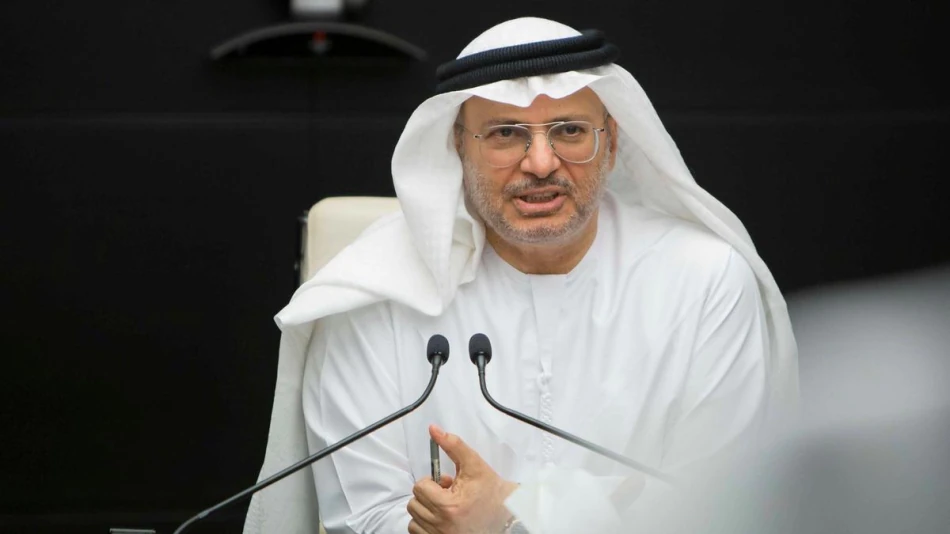
Gargash: The Geopolitical Earthquake Exposes the Lack of a Unifying Arab Vision
Middle East's Political Map Redrawn as Regional Powers Retreat Into Self-Preservation Mode
A stark assessment from a senior UAE diplomat reveals how two years of Israeli military campaigns and militia conflicts have fundamentally altered Middle Eastern geopolitics, leaving Arab nations focused on individual survival rather than collective regional stability. The observation highlights a critical shift away from pan-Arab cooperation at a time when coordinated responses are most needed.
The Fragmentation of Arab Unity
Dr. Anwar Gargash, diplomatic advisor to the UAE President, delivered a sobering analysis of the region's transformation through his official social media channels. His comments underscore how sustained conflicts have pushed Arab states toward a "every nation for itself" mentality, abandoning traditional concepts of regional solidarity.
The diplomat's reference to "bloody two years" captures the intensity of recent conflicts, from Israel's operations in Gaza and Lebanon to ongoing militia activities across Syria, Iraq, and Yemen. These overlapping crises have created what Gargash terms a "geopolitical earthquake" whose full ramifications are still emerging.
The Absence of Collective Vision
Gargash's most pointed criticism targets the lack of a "comprehensive Arab project" capable of delivering stability while preserving sovereignty, dignity, and future prospects. This absence represents a dramatic departure from previous decades when Arab League initiatives, however imperfect, attempted to coordinate regional responses to major crises.
Historical Context of Arab Cooperation
The current fragmentation contrasts sharply with earlier periods of Arab coordination, such as the oil embargoes of the 1970s or collective diplomatic responses to the Iranian revolution. Even during the 2011 Arab Spring, regional powers initially attempted coordinated approaches before diverging into competing camps.
Today's landscape shows Gulf states pursuing independent foreign policies, with the UAE normalizing relations with Israel while maintaining ties with Iran, Saudi Arabia focusing on Vision 2030 economic transformation, and Egypt prioritizing domestic stability over regional leadership.
Implications for Regional Stability
The shift toward national self-interest over collective action carries significant implications for Middle Eastern stability. Without coordinated Arab responses, external powers—including Iran, Turkey, and Israel—face fewer constraints on their regional activities.
Economic and Security Consequences
This fragmentation affects everything from energy markets to security cooperation. Regional trade integration remains limited, defense partnerships operate bilaterally rather than multilaterally, and humanitarian responses to crises lack the scale that coordinated efforts could provide.
For international investors and businesses, the absence of regional coordination creates both opportunities and risks. While individual Gulf states offer attractive investment climates, the lack of integrated markets and coordinated policies limits the potential for region-wide economic strategies.
The Human Cost of Political Fragmentation
Gargash's emphasis on "human suffering" reflects a growing recognition that political divisions have real humanitarian consequences. Refugee crises, economic disruption, and social instability affect millions across the region, yet fragmented responses limit the effectiveness of relief efforts.
The diplomat's assessment suggests that Arab states have become so focused on protecting their individual interests that they've lost sight of shared challenges requiring collective solutions. This trend mirrors broader global patterns of rising nationalism and declining multilateral cooperation, but carries particular risks in a region where conflicts easily spill across borders.
Looking Forward: Pragmatism Over Ideology
The UAE's diplomatic approach exemplifies this new pragmatism, maintaining relationships across traditional divides while avoiding commitments that could compromise national interests. This strategy has served the Emirates well economically and diplomatically, but Gargash's comments suggest awareness of its limitations for broader regional stability.
Whether this period of fragmentation represents a temporary response to crisis or a permanent shift in Arab political culture remains unclear. However, the absence of credible alternatives to national self-interest suggests that individual survival strategies will continue dominating regional politics for the foreseeable future, regardless of their collective costs.
Most Viewed News

 Sara Khaled
Sara Khaled






